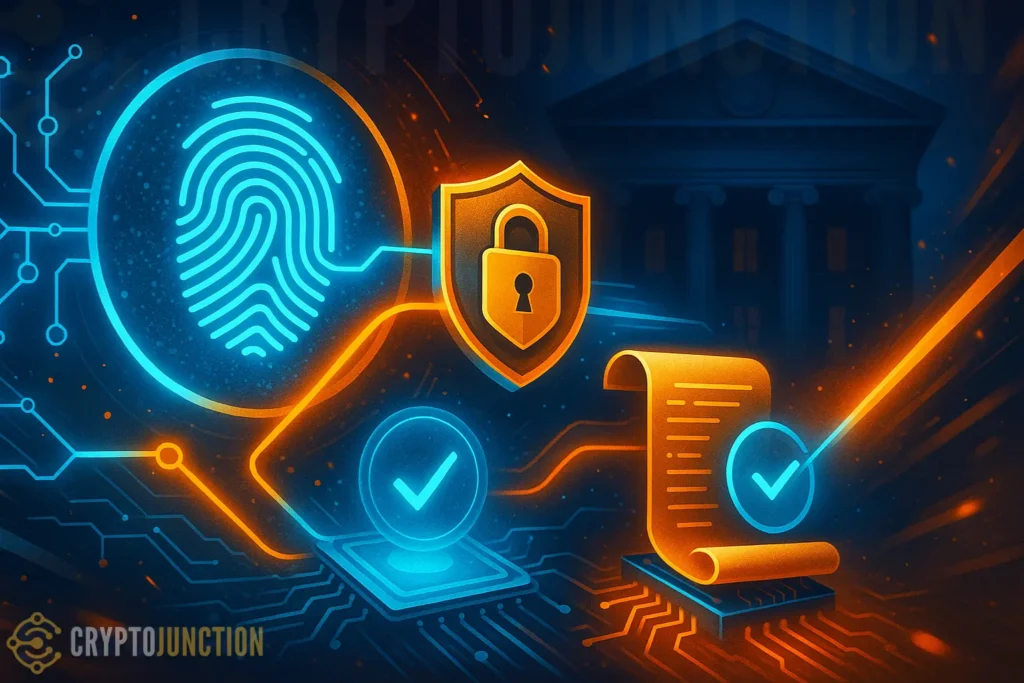The US Treasury Department is considering one of the boldest regulatory shifts in decentralized finance (DeFi): integrating digital identity verification directly into smart contracts. This proposal was put forth by the GENIUS Act and a framework which may see the creation of on-chain solutions. These solutions will fight against money laundering, terrorist financing, and other illegal activities. DeFi digital ID verification could be central to these efforts by ensuring compliance and security.
In July of 2025, President Trump signed into law the GENIUS Act. This act put forth the first in-depth federal legislative effort at the national level for digital assets. It includes rules for stablecoins and also charges the Treasury to research advanced compliance technologies. Additionally, these include APIs, AI-powered monitoring, blockchain analysis, and digital ID verification as part of DeFi digital ID verification strategies.
If implemented, these systems could automatically validate user identities before transactions execute. This embeds KYC/AML safeguards into the very infrastructure of DeFi. This reflects the growing importance of DeFi digital ID verification in modern regulatory frameworks.
On-Chain DeFi Digital ID Verification: Compliance and Innovation Go Hand In Hand
Treasury has put forth a vision of a future in which DeFi smart contracts will serve as automatic compliance agents. Therefore, wallets will be associated with proven ID’s. These may include government-issued documents to biometric-based digital passports. Those which do not pass the authentication barrier will see their transactions fail.
Supporters argue this approach could:
- Cut costs for financial institutions by reducing manual compliance reviews.
- Enhance privacy through pre-transaction screening instead of post-trade monitoring.
- Strengthen AML/CFT protections by catching suspicious activities in real time.
The system will have digital identity verification along with APIs for smooth data exchange. It will use AI for risk evaluation and blockchain-based monitoring tools. This establishes a framework where traditional banks and DeFi platforms can use DeFi digital ID verification to identify bad actors. This will occur prior to any financial transaction.
Challenges, Pushback, And Industry Impact
Despite its promise, the plan faces resistance. DeFi’s decentralized nature means there’s no central authority to enforce KYC rules, raising questions of accountability. Technical hurdles also loom: immutable smart contracts are difficult to update with evolving regulations. Meanwhile, pseudonymity remains core to crypto culture.
Critics note that instituting strict DeFi digital ID verification may see users go to foreign, non-compliant platforms. Additionally, some worry that privacy trade-offs may put a damper on DeFi’s great aspect, which is anonymity.
At present, banking entities, including the Bank Policy Institute, are reporting on flaws in the GENIUS Act. They say these may allow stablecoin-tied yield products to put trillions into play at the expense of traditional deposits. This pushback, as analysts have pointed out, is more so out of competition concern than regulatory risk.
Globally, the U.S. is putting itself forward as a leader in crypto regulation. This represents a shift from “regulation by enforcement” to more proactive frameworks. The public input period runs to October 17, 2025. At that point, the Treasury will report to Congress with recommendations on how DeFi digital ID verification can be enhanced and implemented effectively.
If this plan is approved, it may see very large scale changes in the DeFi markets. This, in turn, may put forward the division between what is in compliance and what is not. Additionally, it may set the stage for what comes with the regulatory side going forward.

